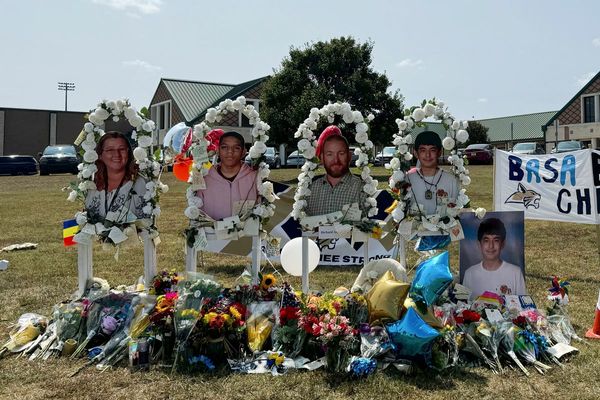LOS ANGELES — An Orange County Superior Court judge on Friday ruled that Orange County District Attorney Todd Spitzer violated the Racial Justice Act when he made comments about the dating habits of Black men while discussing the case of double murder defendant Jamon Buggs.
However, Judge Gregg Prickett stopped short of imposing any sanctions that would have reduced Buggs' sentence. The appropriate remedy in the case — seeking life without the possibility of parole rather than the death penalty — had already been applied by the district attorney's office, Prickett said.
The Racial Justice Act, passed in 2020, prohibits prosecutors from seeking or obtaining a criminal conviction or imposing a sentence based on race, ethnicity or national origin.
"The defendant has received what the statute would say was the appropriate remedy for the violation," Prickett said. "The court does not find that it would be in the interest of justice to dismiss enhancements, special circumstances or reduce charges."
Prickett is expected on Friday to sentence Buggs, who was convicted of murder in May for fatally shooting a man and woman inside a Newport Beach condominium, allegedly in a jealous rage, to life in prison.
"The judge ruled that the defendant was treated fairly by District Attorney Spitzer at every stage of the proceeding, from charging to conviction to the sentence of life without the possibility of parole for executing two innocent people in cold blood," said Kimberly Edds, a spokeswoman for the district attorney's office.
During a roughly two-week trial, Buggs' attorneys argued that he killed Darren Partch, 38, and Wendi Miller, 48, in the heat of passion, fueled by what they described as a toxic relationship between Buggs and his ex-girlfriend, Samantha Brewers.
They asked jurors to consider downgrading the murder charges to voluntary manslaughter based on Buggs' state of mind at the time of the killing.
In late February or early March 2019, Brewers and Partch met at a gym and they exchanged Instagram usernames so they could keep in touch. The two were not dating, but Buggs became mistakenly convinced that they were a couple, Senior Deputy District Attorney David Porter said.
Buggs later called Partch to tell him to stay away from Brewers. Partch agreed. But Buggs' jealousy drew him to Partch's apartment sometime after 1:45 a.m. on April 20, armed with a .38-caliber handgun, Porter said.
While standing in the courtyard of the townhouse, Buggs apparently heard Partch and Miller being intimate in the upstairs bedroom and entered the townhouse through an unlocked door with his gun drawn. He shot Partch twice and Miller once.
Buggs' attorneys say he mistook Miller for Brewers.
The case has been mired in controversy since Spitzer made his racist comments about the dating habits of Black men during an October staff meeting on whether to pursue the death penalty against Buggs.
At the meeting, Spitzer told prosecutors that he knows "many Black people who get themselves out of their bad circumstances and bad situations by only dating white women," according to a memo written by then-prosecutor Ebrahim Baytieh, who attended the meeting.
Spitzer has said allegations of "any racial animus or bias against the defendant are baseless and quite frankly offensive."
Buggs is Black, while Buggs' ex-girlfriend and Miller are both white. Spitzer has alleged that Baytieh wrote the memo in retaliation because Spitzer had initiated an investigation of him related to another murder case.
Spitzer has said that he asked questions about the race of Buggs' former girlfriends during the October meeting to address the possible issue of cross-racial identification — how well Buggs, as a Black man, could identify with a white woman like Miller.
Denise Gragg, one of Buggs' defense attorneys, argued the "idea that (Spitzer) brought up a relationship between Black men and white women because of an identification issue is nuts."
In the months leading up to the sentencing hearing, Prickett combed through thousands of emails sent between members of the district attorney's office about the case to determine what materials, if any, should be provided to Buggs' defense attorneys.
Late last month, Prickett turned over an unknown number of documents. The documents, which were filed under seal, have not been made public.
Buggs' defense attorneys have argued that Spitzer's comments and actions kept Buggs from receiving a fair trial.
Prosecutors argued in court Friday that the defense failed to provide a preponderance of evidence that Spitzer's comments negatively affected Buggs' trial.
But Gragg argued that it would be untenable for the court to require a written document from Spitzer saying the case was damaged because of bias as proof that a violation occurred.
Gragg said that Spitzer "refuses to even admit this was a biased statement."
"Justice is not just done from the jury box. It's done from the back halls, it's done in chambers .... ," she said. "That is the place where this case was damaged."







